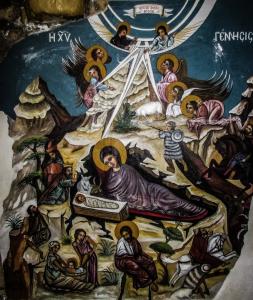For many of us, this is a Christmas without family celebrations, mall Santas, rousing performances of Handel’s Messiah, and Christmas Eve candlelight services. All is not lost, however. Starbucks has come through with a lovely selection of red-and-green holiday cups, one of which contains the word “merry,” thank goodness. Because of course in the midst of everything, we can once again say “Merry Christmas,” and as a reminder, feel free to secure your own (free, with a $45 donation) ornament commemorating this fact.
Christians know, however, that the first Christmas was also not as anticipated. Mary, no doubt, would have preferred avoiding the strenuous journey to Bethlehem by foot or by donkey at full-term, instead giving birth in the comfort of her own home, or at the very least finding a room in the inn. In truth, the arrival of the long-awaited savior of the world fell short of nearly everyone’s expectations. The Son of God entered the world in a dirty stable (or cave), born to an unwed mother, and greeted by angels but also a crowd of unkempt shepherds. It wasn’t a promising first act for the Messiah who was supposed to liberate God’s chosen people.
But of course that’s exactly the point. The good news of the gospel is that the savior of the world subverted human expectations. And as the apostle Paul wrote in his epistle to the Philippians, followers of this Christ are called to do likewise:
In your relationships with one another,
have the same mindset as Christ Jesus:
Who, being in very nature God,
did not consider equality with God
rather, he made himself nothing
by taking the very nature of a servant,
being made in human likeness.
And being found in appearance as a man,
he humbled himself
by becoming obedient to death—
even death on a cross!
Therefore God exalted him to the highest place
and gave him the name that is above every name,
that at the name of Jesus every knee should bow,
in heaven and on earth and under the earth,
and every tongue acknowledge that Jesus Christ is Lord,
to the glory of God the Father. (Philippians 2:5-11, NIV)
Before Paul wrote to the church in Philippi, however, it was Mary’s Magnificat that first gave expression to this paradox:
My soul glorifies the Lord
and my spirit rejoices in God my Savior,
for he has been mindful
of the humble state of his servant.
From now on all generations will call me blessed,
for the Mighty One has done great things for me—
holy is his name.
His mercy extends to those who fear him,
from generation to generation.
He has performed mighty deeds with his arm;
he has scattered those who are proud in their inmost thoughts.
He has brought down rulers from their thrones
but has lifted up the humble.
He has filled the hungry with good things
but has sent the rich away empty. (Luke 1: 46-53, NIV)
Through the centuries, Christmas songs have echoed this wonder at the God of the universe becoming a baby, wrapped in swaddling clothes and lying in a manger.
One of my favorites that I grew up singing is a centuries-old Dutch carol, “Come and Stand Amazed You People.” The song draws on Paul’s letter to the Philippians, and also on Luke 2 and John 1 and 14. Four years ago, with (half) the country reeling from the election of Donald Trump, and (at least some) Christians distraught over the role white Christians had played in that victory, I reflected on this hymn here at The Anxious Bench.
This Christmas Eve, the witness of the white American church is, if anything, more compromised than it was four years ago. And so it seems appropriate to return again to the words of this ancient hymn:
Come and stand amazed, you people,
See how God is reconciled!
See his plans of love accomplished,
See his gift, this newborn child.
See the Mighty, weak and tender,
See the Word who now is mute.
See the Sovereign without splendor,
See the Fullness destitute.
See how humankind received him;
See him wrapped in swaddling bands,
Who as Lord of all creation
Rules the wind by his commands.
See him lying in a manger
Without sign of reasoning;
Word of God to flesh surrendered,
He is wisdom’s crown, our King.
O Lord Jesus, God incarnate,
Who assumed this humble form,
Counsel me and let my wishes
To your perfect will conform.
Light of life, dispel my darkness,
Let your frailty strengthen me;
Let your meekness give me boldness,
Let your burden set me free.
Oh, Emmanuel, my Savior,
Let Your death be life for me!
This song makes the paradox plain: The mighty, weak and tender. The Word, now mute. The Sovereign, without splendor. The Fullness, destitute. It is to this incarnate God that Christians—followers of Christ—are called to conform.
This is a theology that has no space for self-aggrandizement or the assertion of coercive power. To be blunt, it has nothing to do with the grandstanding that we’ve seen in certain Christian circles of late, from the spate of sexual abuse scandals to the recent Hillsong fiasco (a church operating under a “hierarchy of coolness”) and the antics of prominent Christian leaders at the recent Jericho march.
When this paradox—strength in weakness, elevating the lowly, and, yes, bringing down rulers—is stripped from the gospel, the “good news” is quickly corrupted into a quest for power, all the more dangerous because it is cloaked with illusions of righteousness.
It is this corruption that is at the heart of the story I tell in Jesus and John Wayne—a corrupted “gospel” that glorifies violence and denigrates weakness, that seizes power and revels in access and influence. The book is a work of history, but it’s worth noting that a portion of the subtitle—How White Evangelicals Corrupted a Faith—is not, in fact, a historical claim. There has been no time in Christian history where “followers of Christ” have not fallen tragically short of this theological ideal. But in this particular historical moment, at a time when many American Christians have rejected this ideal in its entirety, an intervention seemed in order. The subtitle points to the fact that in offering a historical account, I want to confront “Bible-believing Christians” directly with their own story, to hold it up as a mirror, to encourage the self-reflection that I think is required of all of us. But perhaps some of us more urgently than others.
If theology matters at all, then how one understands the Jesus of the gospels will shape one’s convictions and behaviors. In my introduction to Jesus and John Wayne, I put it this way: “[W]hen evangelicals define themselves in terms of Christ’s atonement or as disciples of a risen Christ, what sort of Jesus are they imagining? Is their savior a conquering warrior, a man’s man who takes no prisoners and wages holy war? Or is he a sacrificial lamb who offers himself up for the restoration of all things? How one answers these questions will determine what it looks like to follow Jesus.”

In other words, will one be drawn to power and give more power to those who already have much? Or will Christians seek to echo the Magnificat in their own faith and life?
On the last Sunday in Advent, my congregation sang (remotely) Rory Cooney’s 1990 “Canticle of the Turning,” a more recent song based on the Magnificat that gives a glimpse of what this might look like:
My soul cries out with a joyful shout
that the God of my heart is great,
And my spirit sings of the wondrous things
that you bring to the one who waits.
You fixed your sight on the servant’s plight,
and my weakness you did not spurn,
So from east to west shall my name be blest.
Could the world be about to turn?
Though I am small, my God, my all,
you work great things in me.
And your mercy will last from the depths of the past
to the end of the age to be.
Your very name puts the proud to shame,
and those who would for you yearn,
You will show your might, put the strong to flight,
for the world is about to turn.
From the halls of power to the fortress tower,
not a stone will be left on stone.
Let the king beware for your justice tears
every tyrant from his throne.
The hungry poor shall weep no more,
for the food they can never earn;
These are tables spread, ev’ry mouth be fed,
for the world is about to turn.
Though the nations rage from age to age,
we remember who holds us fast:
God’s mercy must deliver us
from the conqueror’s crushing grasp.
This saving word that our forbears heard
is the promise that holds us bound,
‘Til the spear and rod be crushed by God,
who is turning the world around.
Refrain:
My heart shall sing of the day you bring.
Let the fires of your justice burn.
Wipe away all tears,
For the dawn draws near,
And the world is about to turn.
What better time than during this pandemic Christmas to embrace the paradox at the heart of the Christian faith.
The first Christmas was not one of excess, of the exercise of self-aggrandizing power or the assertion of rights and privileges. Instead, it is an astonishing story that never meets human expectations because it was never meant to, that finds strength in weakness, expects the mighty to be deposed and the lowly to be exalted. And it points us to a time when dawn will come and when tears will be wiped away.
And this feels very 2020.
Originally published December 24, 2020. Anxious Bench. Patheos.com https://www.patheos.com/blogs/anxiousbench/2020/12/on-pandemic-christmas-eve/




